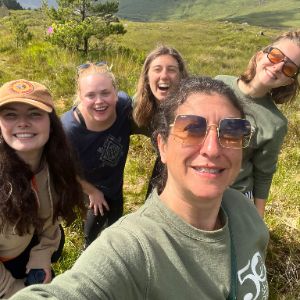Striving for environmental sustainability in our shopping habits is no easy feat.
I find myself having to make tricky decisions every day of the week.
One of the first problems I encounter personally, is the issue of TIME, or lack of time to be precise.
I am blessed to live in an area where I ...
Recently, we met with Clare Tait, the founder and owner of Chocolatey Clare, an Irish business making a range of luxury confectionary. The products are vegan-friendly; dairy, gluten and palm-oil free; with ethically sourced, where possible -organic ingredients; and plastic free packaging.
At Fift...
Have you ever put an item into the wrong bin? Food in landfill, landfill in recycling. Did your brain tell you for a second this is wrong and you still did it?
I know I have, and I am ashamed to admit it but hey, it’s the truth. I worked in the Hospitality Industry and this is a hard paced, busy, ...
At the end of May, our team organised an online event called ‘Generation Tomorrow’ for students in Co. Wicklow and in Nigeria.
The students presented their research and findings on two topics - food waste and water.
Of course we expected differences and this is what made it such a valuable and ins...
The pandemic has sent sanitation and hygiene to stratospheric levels of compliance for the majority of people and businesses. Never have we paid such close attention to what we touch and how we clean to keep ourselves “safe”.
It is no surprise that with such demand, the offer for new products and s...
I have been working as an educator for environmental sustainability for a few years now, and never have I been more disillusioned than in recent times.
I like many others, had confidence and trust in the many “labels” seen on products we consume. ‘Eco-labels’ - Free from Tuna, Sustainable Palm Oil,...
I am a Hospitality professional with an entrepreneurial mind.
I have worked as a Hotel Manager for 20 years of my life, but I always knew I wanted to do more, I wanted to do something different, something that changed our industry for the better and had a positive impact.
That is why in 2017 I fo...
Utility bills are often looked at solely to see the total cost to be paid and then filed away.
How many people analyse them to become more energy efficient? Now there are many options in terms of energy providers, and I think it is time that we took a minute to see how they can help us, their cus...
Those who work in the hospitality industry are feeling a shift in perspective post-lockdown in Ireland. Many have remained with their previous employer and have returned for the new season, but some have moved on to a new business or even a new industry.
This lockdown (#3) has given us all time to...
This is difficult to determine, because there is more than one issue at stake.
In terms of Co2 emission at the production stage, Tetra Pak cartons are the winner, followed by plastic, then aluminium, and surprisingly then glass is the worst.
Glass is the highest producer of carbon emissions becaus...
Over the past number of weeks, as the hospitality has prepared for reopening in both Ireland and the UK, we are constantly hearing from business owners and managers and the difficult they are having in rebuilding their teams.
There are many factors affecting staff retention within hospitality and s...
I am blessed that because of my job, I get to work alongside secondary school students but also the hospitality industry workers, through our Hospitality programmes.


